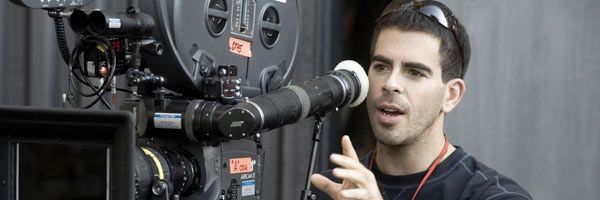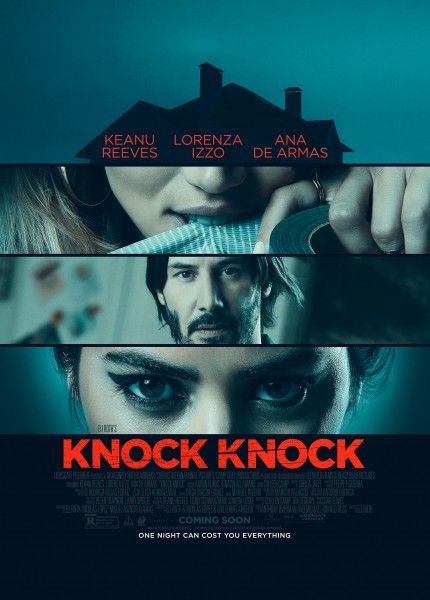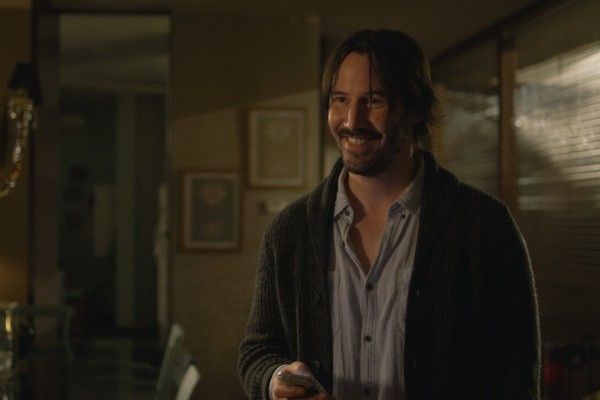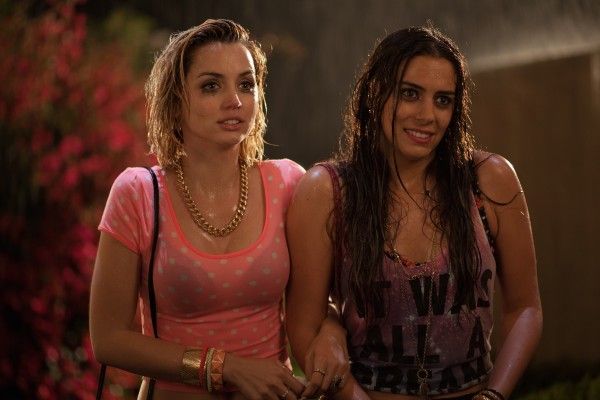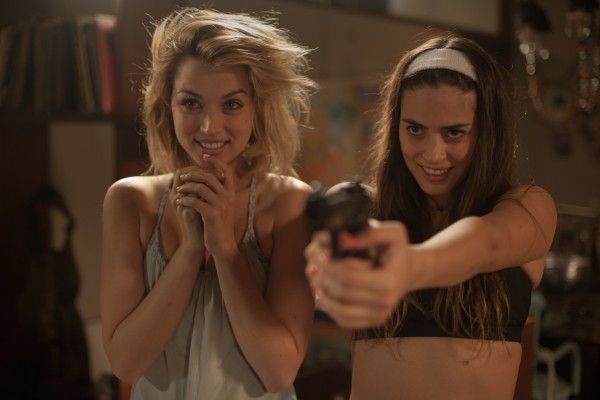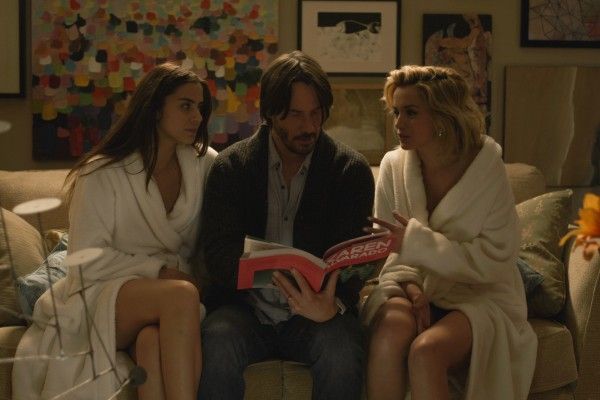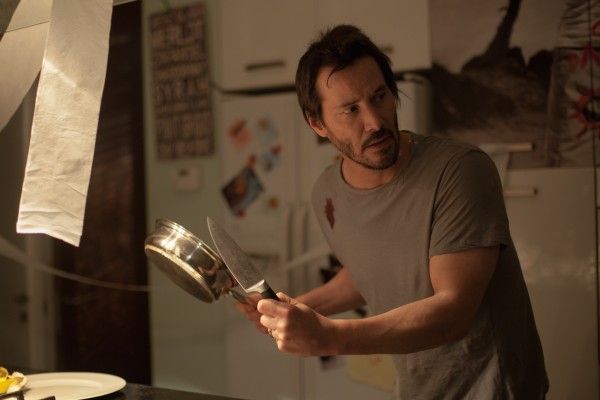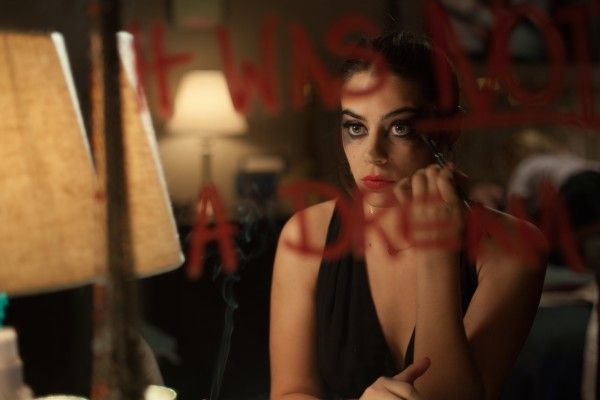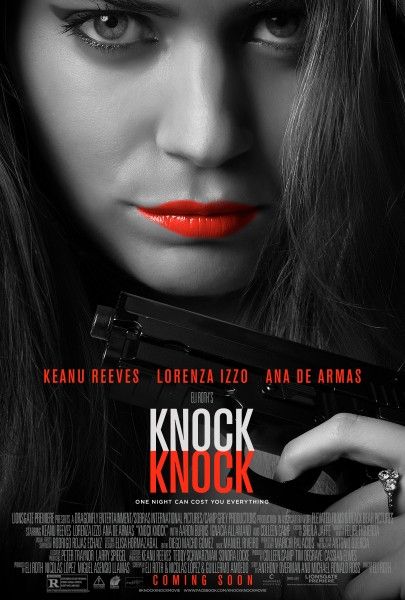Evan Webber (Keanu Reeves) is a loving family man, but if two beautiful young women show up at his door when he has the house to himself, would he remain so devoted? That’s what Genesis (Lorenza Izzo) and Bel (Ana de Armas) want to find out in Knock Knock. It’s Father’s Day and Evan’s wife and kids have a trip to the beach planned, but he’s got to stay home and work. Trouble is, he doesn’t get much done because that’s when Genesis and Bel show up. Initially, Evan’s under the impression that they got caught in the rain and just need to make a phone call for a ride home, but he soon comes to realize that they’ve got quite the plan for him.
With Knock Knock hitting theaters and VOD on October 9th, I got the opportunity to hop on the phone with director Eli Roth to talk about his experience making the movie. Check out what he told me about the inspiration for the story, the disturbing questions the movie poses, his thoughts on working under the studio umbrella and much more in the interview below. Also be sure to click here to check out our latest Knock Knock poster debut.
Question: Can we start at the beginning? What sparked the idea for Knock Knock?
ELI ROTH: The inspiration is a film that Colleen Camp was in called Death Game. That was a very little seen film that got released overseas but kind of fell into obscurity in the US and was never really released. We wanted to do kind of an updated version. I really wanted to do a film like a modern Fatal Attraction that felt like something that was a tense psychosexual thriller, like the old films that [Roman] Polanski used to make or Paul Verhoeven, but we just felt like the story and the setup were so good that we could do an amazing update of it. And it all happened really fast from sitting down with Nicolas Lopez and Guillermo Amoedo and writing the screenplay to getting the financing to getting Keanu Reeves on board, I think maybe a week or two before we started shooting. It’s just one of those films that came together really, really quickly.
But I felt the themes of the film were so relevant. I wanted to do an updated version where you’re talking about the evil forces that we let into our life. My other films, Cabin Fever, Hostel and The Green Inferno, I refer to them as my travel trilogy because they’re kids that go out of their way to go to the far ends of the earth for various reasons. Like, in Cabin Fever it’s the party and being irresponsible for the last time, in Hostel they’re looking for sexual adventures they couldn’t find in America, and in Green Inferno it’s to save the Amazon, and I wanted to show the dangers of what happens when you let that evil into your own home. And also to show the generational difference between how people in their 40s think versus people in their late teens or early 20s using social media, this idea that before an affair was something that was a private thing that happened, but now if someone really wanted to, they could completely destroy your life in any number of ways. And Keanu was a perfect casting choice because we’re so used to seeing him save the world and be the one in charge and it’s really fun to watch these girls just lead him along and lead him in this game of cat and mouse where they’re always one chess move ahead of him and he really plays right into their hands.
I’m surprised I’ve never made that connection with your other films. Is there any chance we could get a housebound-type trilogy from you now?
ROTH: I don’t know. I started with a cabin, maybe I have to do something in a hotel. It’s interesting how you have certain themes and obsessions. You’re not aware of why you’re making the movie. I’m just going with my gut going, ‘This is a movie I really want to see,’ or, ‘There really hasn’t been that type of film. There hasn’t been that type of Fatal Attraction type movie that has that sexually charged element to it, someone cheating on their wife.’ I’ve noticed that, you know, I’m 43 and a lot of my friends who have been married for many years got married younger and they all ask me, ‘What’s it like with a younger girl? Are they that much wilder and that much crazier than when we were in our 20s?’ Because there is this fantasy element that I think in particular men have, this feeling that they missed out on something and is the generation that’s under you that much crazier, that much more wild? It’s this very kind of male fantasy that the generation that’s much younger grew up with internet pornography, that kind of sex and threesomes and bi-sexuality is no big deal, and these girls know that and they play right into that. They just basically spell out this fantasy that they can tell this guy wishes he had because he’s been married for 14 years. I think it’s human nature, human curiosity, but also someone who wants to take advantage of the situation. The philosophical question at the center of the movie, it’s what the writers call ‘the free pizza question,’ which is the theory that no guy will say no to a free pizza. If you’re sitting in your house and a free pizza shows up at two in the morning, will you turn it down?
Have you noticed a difference between how male viewers and female viewers receive the movie and what they take away from it?
ROTH: For sure. I think if people get caught up in the story, people that are married, it’s a terrifying type of film because the first half is just fantasy. People that are younger love it. The teenage girls that love it, love the girls, they love the women, they understand where the women are coming from. These aren’t just psychopaths. You’re talking about a generation where there’s a lot of divorce and a lot of bad things that happen to young women who’ve been taken advantage of in a number of ways, and these girls believe that no matter what, even if a man is window-dressed with kids and a wife and pictures all over their house and a home, no matter what, deep down if you put it out in front of them, all men will take the bait because all men are basically the same. And I think that that’s a very real attitude and a very real point of view.
There’s complexities in all of the characters. I didn’t want to make a movie of, Keanu’s a good guy who makes one mistake. You can see in the beginning the frustrations that Keanu has. I think it’s about how when you don’t deal with a problem in a relationship, it’s going to come out in some way or another. You can pretend everything’s fine, but if there’s an unhappiness or you’re not having sex or you’re not communicating or you’re made to feel third best in the house and you don’t address it and you just try to put on a nice face and a smile, that kind of aggression and anger is going to come out in some other sinister way. So the film also, people understand that if maybe there had been more open and honest communication, something like this wouldn’t have happened. It’s not that anyone’s evil. It’s that we’re all human and that’s what I think makes it interesting, but people have really enjoyed it. People love the movie for different reasons.
How much backstory do you have to do for characters like Bel and Genesis? I found it interesting that you never flat out reveal their motivations, so do you need to figure that out for yourself before you jump into it?
ROTH: Of course. In the scene when Genesis is doing her makeup in the mirror and Bel is hitting her and going, ‘Why did you do that to me,’ and goes into this very dark fantasy in her head, you just get a taste of it where we can say, ‘Okay, for sure some abuse has happened to this girl and this is how she’s working it out.’ And the fact that Genesis doesn’t even react and is just staring in the mirror as if there’s not even anything strange going on, it really kind of shows that she’s seen this before. These are two girls that have been through a lot, but one thing I learned, I certainly went through this with [Quentin] Tarantino’s school of writing, acting in Inglorious Basterds, even if you had no lines in that movie you had to have your entire character’s history. Everybody has to know where they’re coming from, what they’re doing, why they’re doing it, who they are. These are essentials.
I think that Lorenza [Izzo] and Ana [de Armas] are so superb as these characters and that doesn’t happen by accident. You have to have underlying motivation for everything. And we talked about how in the movie, the first 45 minutes, all of the dialogue, none of it means anything. Their mouth is saying one thing, but their feet keep moving forward, and all of the conversation, everything has an ulterior motive and it’s all to get him towards this one goal. And then the next morning when he walks in and sees them at breakfast, the first thing he says to them is, ‘I thought you guys left.’ And that’s when it turns. We talked about how if he had said, ‘Wow, that was crazy. I think I’ve realized something about my relationship. I’m gonna talk to my wife and tell her that maybe I’m unhappy or we should get separated. This made me realize things. Thank you, guys. Can I make you breakfast,’ they might have treated him differently. But the fact that he wants to dispose of them, he wants to get rid of them, which is exactly what they expect from him. So in terms of writing and backstory and character, that’s essential. I don’t think you can have the performances we have from Lorenza Izzo and Ana de Armas without that kind of backstory and character.
Absolutely. I also think your shot selection really enhances their performances, seeing them move from shots of the two of them to their own singles. Did you have some sort of methodology to when you were going to do that?
ROTH: Absolutely. It’s very important that first we see them as a team and then there are certain moments - part of the game is almost that Genesis dangles Bel out because she’s the innocent one and she knows when she sits in the background and lets Bel look around the house, when she leaves them to dance, that’s all very, very calculated, and when they go into the shower, everything. I wanted to photograph them as a team and then there are certain moments where, you know, that whole sequence we call the musical chairs sequence at the beginning of the film, we’re really with Keanu. You’re seeing it through his eyes, so watching him sit there in close-ups uncomfortably and breathe was all very, very calculated.
If Green Inferno is a roller coaster, this is a tightrope, this is a chess game that just gets more and more tense with every single move because I want that tension to blow up into the sex scene, which is not a passionate scene, it is not a romantic scene. It’s this very aggressive, animalistic release of all of his frustrations. If you notice the wife doesn’t have sex with him and even on Father’s Day, they’re leaving him to go to the beach. In any other relationship they might’ve said, ‘Well, you know what? If you can’t go, we can’t go,’ but it’s like he’s sitting there basically working for them, and he has all of these little frustrations that come out. He can’t really say it so he sort of does the monster game a little bit with his wife saying, ‘Monster sad.’
You know, it’s all about her. Her artwork dominates the house. It’s his building, but it’s almost like he ceded all of the control of the house to his wife, and even her catalog comes on Father’s Day. He’s just kind of like the dad providing for her career and these two women come along and they say, ‘Your long hair is good, your muscles are great, we think you’re hot, we thought you were younger.’ They treat him like a sexual being and really play into his ego so I really wanted to show the girls as a team and then seeing Keanu’s face, and then saving those moments when it’s uncomfortable tension and it cuts to Lorenza in a close-up and she gives a look, and Ana just gives him this dead stare that says everything. In editing we played with that, but in the photography, I was very, very conscious of making sure that we were inside Keanu’s head and understanding that tension and understanding the girls and what their motivations were and what they were doing.
Can you tell me about the wife’s artwork in the film? Why go with that style? Did it have anything to do with your shot design and the look you wanted for the film?
ROTH: Yeah. I liked the Spanish style of artwork and we had a bunch of Chilean artists that I had seen while I’ve been kind of shooting there [for] a year or two, but I liked that it’s big and it’s bright and it’s colorful. My mother’s an artist and there’s an idea that I find somewhat terrifying - what is art? What is the idea of art? Just because someone does a painting and someone else calls it art, does that make it art? It’s certainly with abstract art. That’s why they spray paint on the walls ‘art does not exist.’ That was a very philosophical discussion. Why is a David Salle painting worth what it’s worth? Why is a Julian Schnabel painting worth what it’s worth? To one person, it’s a priceless work of art and to someone else it could mean nothing who doesn’t know anything. I remember watching my mother painting. She showed at the OK Harris Gallery in New York and watching the way her paintings were handled. There’s a terrifying idea that someone could just come in, see it and slash it. It means nothing to them. So this whole idea that the very thing you create, you’re very purpose for why you exist, to another person it’s completely worthless.
To me, Knock Knock is everything. To someone else, it’s garbage, it means nothing. So that’s an idea that I find fascinating. What is art? And I wanted to have these colors and this vibrance and this light in this world surrounding him everywhere you go, and these girls just smash it, they destroy it. I wanted to substitute, instead of chopping off heads, if you notice the sculpture’s are painted red. It’s almost like the “art version” of The Green Inferno, the way that the natives look in The Green Inferno. In Hostel, we’re chopping off body parts, but in here they’re chopping up the statues. I wanted to substitute the statues for body parts, and really the film is about the destruction of everything you create. You create your home, you create your artwork, you create your world, and if you let in a force that doesn’t care, you’re vulnerable to it. It can all completely unravel. Like Louis, the whole thing is how it’s bubble wrapped and, ‘I hope they don’t screw it up like the last time that gallery did.’ Everything that happens, these are precious, priceless works of art but to these girls, it’s just garbage, it’s nonsense. And that’s a terrifying idea, that art actually doesn’t exist. It’s just something that we place the value on because we decided it was worth that.
Before we have to wrap I wanted to ask, so many of my favorite independent horror filmmakers are getting snatched up for big-budget franchises and superhero movies, but it seems like you’re almost going in the opposite direction. Keeping things small, intimate, low-profile, and your way. Is that a deliberate choice or would you consider doing one of those as well?
ROTH: Absolutely. I would. I’m prepping a movie, Meg, at Warner Bros. right now. After Hostel, I was offered all of the greenlight - you know, I had a #1 movie that I wrote, produced and directed that made the studio a lot of money and I got offered everything, and I just felt that either I wasn’t ready or the project wasn’t right or I just wasn’t interested. I have my own ideas and my own way of expressing them, and I’m very independent and I really like to do what I want, so I didn’t want to put myself in a situation - now, here’s the thing. I do love studio movies. I’ll always go see big popcorn movies, but my feeling is I didn’t want to just sit there and just make a movie.
If I’m gonna make a movie, I have to feel like I’m the only one that can do it. I didn’t want to be plugged into a movie that I felt like ten other people could do and it’s basically gonna turn out the same way. I think that the machine of Hollywood makes terrific movies and some of them turn out amazing and some of them are kind of boring, but my feeling was, if I’m going to get involved in a movie like that, and it’s not even about having final cut, it’s that I want to collaborate with people that are better than me and smarter than me so that we can really make one of those great, elevated genre movies the way Steven Spielberg does, the way James Cameron does, the way Peter Jackson does, that’s the goal is to make that type of movie. We’ll see what happens with Meg. It’ll be my first experience doing that.
The nice thing about Green Inferno, all of my films, is that good or bad, I’ve made them the way I want to make them. I’m always making it for an audience. It’s not just about “my personal vision” and I want to make movies that are first and foremost entertaining, but I feel like I have a unique voice and I enjoy expressing it and thankfully the audience has responded, and if I can do that on a bigger scale, as long as I’m making the movie that I’m really excited to see, that’s my gauge for everything.
Having brought up the idea of needing to feel like you’re the only one who can make a particular movie, can you tell me about the decision to let them do the Cabin Fever remake? I’m fascinated by the idea of doing that with the original script.
ROTH: Here’s the thing, I wrote that movie when I was 22 and when I wrote it, everyone told me, ‘This will never get made, that is a piece of shit and this is a terrible script,’ and the idea of rebooting a movie with the original, I’m not in control of the rights so I couldn’t stop it. And they asked me to be involved and I said, ‘I’d rather be involved because no matter what, I’m forever tied to that movie,’ and to me I thought of it as re-staging a play, I thought, ‘I want to see what that movie looks like,’ out of my own curiosity. And on a very egotistical level, it’s very satisfying 20 years later after people told me that script was unmakeable to have people going in and reading it and auditioning it and loving it and re-reading the screenplay and enjoying it, I thought was great. And Travis [Zariwny], the director, had an idea to change a lot of the deaths and keep the basic movie the same, and I thought, ‘You know what, why not? Let’s see it. Who am I to say no?’ And now I can say the script that everyone hated I can say was so good they made it twice. [Laughs]

